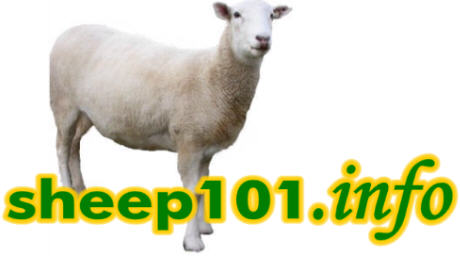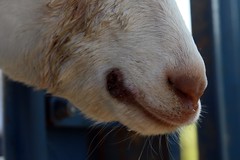In sickness and in health
Zoonoses
A disease that can be naturally transmitted from animals to
people is called a zoonotic disease. There are a handful of diseases
that people can get from contact with sheep.
Diarrhea
If infective sheep feces are handled, diarrhea infections such
as cryptosporidia, salmonella, or e. coli 0157:H7 are possible, though uncommon.
The risk is greatest for children and those with compromised immune
systems. Prevention is simple: wash your hands in warm, soapy
water after handling sheep and/or their feces.
Abortion
The biggest health risk sheep pose is to pregnant women. This
is because some of the same organisms that cause abortion in ewes
can cause a woman to abort (miscarry). The most common causes
of abortion in sheep are enzootic abortion (chylamydia), vibrio (campylobacter) and toxoplasmosis.
Domestic cats are the common carrier of toxoplasmosis. Because
of the risk, pregnant women should not be involved with ewes that
are lambing. It is always a good idea to wear gloves when assisting with
the delivery of lambs or handling fetuses or placental fluids.
Soremouth (orf)
Soremouth (orf) is the most common skin disease affecting sheep (and goats).
It is caused by a virus in the pox family. It can be transmitted
to humans and cause painful sores on the hands, arms, and face.
The virus can be transmitted by handling infected sheep or by
administering the live vaccine to animals. A study in England
showed that 23 percent of sheep farmers and sheep farm employees
have been infected with orf.
Ringworm (club lamb fungus)
Ringworm (also called club lamb fungus) is a fungal disease that can be transmitted
from sheep to sheep and sheep to people. The lesions in people appear as a red, thickened
rash. In extreme cases, ringworm can cause disfiguring scars.
Injuries
People, especially children and older people, can become unnecessarily injured
when working with livestock, including sheep. Safety should be
the primary concern when handling all livestock. Safe handling
is also less stressful to the livestock. The use of specialized
handling equipment minimizes the stress and risk of injury to
both the shepherd and animals.
Don't get rammed
Some shepherds have been seriously injured by rams (intact
male sheep). Rams don't need to have horns to be dangerous. Several
years ago, a Suffolk ram was implicated in the death of an elderly
couple. Under no circumstances should a person trust a ram and
turn his or her back on a ram.
Even the most docile ram can become
aggressive when you least expect it. It is a ram's natural behavior
to charge, if he thinks you are challenging his dominant position
in the flock. Rams are especially aggressive during the rutting
(mating) season. Overly aggressive rams should not be kept.
No mad sheep
Sheep (and goats) can get scrapie, a fatal, neurological disease
that is in the same family of diseases as "mad cow"
disease (bovine spongiform encephalapathy), chronic wasting disease
(of mule deer and elk) and classic and new variant Creutzfeld-Jakob's
disease (affecting people).
There is no evidence to suggest that
people can contract scrapie or any other transmissible spongiform
encephalopathy (TSE) from contact with livestock or by consuming
sheep meat or products made from sheep milk.
<= RAISING SHEEP




